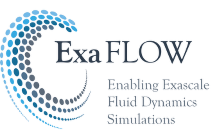- WP 1 : Algorithms
The aim of this work package is to develop the mathematical and algorithmic knowledge to improve upon the current state-of-the-art in terms of scalability. To this end, work is divided into five separate tasks that form the major barriers between the present forefront CFD simulation techniques and the goal of extending simulations to exascale computing. These tasks involve: 1) developing scalable adaptive methods, where error estimators drive h-,p- and r- adaption process, 2) extending heterogeneous modelling to exascale, 3) developing a new mixed CG-HDG formulation to minimise communication costs, 4) reducing the amount of data that must be transferred from memory to disks by using filters for structure extraction and data reduction and 5) development of fault tolerant algorithms to ensure resilience to hardware faults.
- WP 2 : Implementation
Work package 2 focusses on the scalability, portability and implementations of the algorithms as derived and studied in work package 1. Said algorithms are implemented in different parallel programming models to test the performance and scalability on different machine sizes. Understanding the scaling range of each algorithm is important for optimum end-user selection. Data compression is studied in this work package where different options for minimizing storage requirements explicitly for CFD data are researched. Finally, the power and energy characteristics of each implementation of studied using specialist hardware which give very fine grained data. This allows the trade-off between energy to solution and time to solution for each implementation to be understood leading to optimal use of resources. Work package 2 is also tasked with keeping abreast of advances in technology which will likely impact CFD applications during and beyond the lifetime of the project.
- WP 3 : Validation and Use Cases
In this WP we analyse the efficiency of the methods developed in WP1 and implemented in WP2 through a set of synthetic and real-world benchmarks. The benchmarks have been chosen according to the requirements from our industrial partners to ensure that the project will have impact both in academia and industry. The objectives are to benchmark the current potential and limitations of the ExaFLOW codes with respect to exascale applications and evaluate developments from the user perspective.
- WP 4 : Dissemination and Exploitation
Work package 4 is concerned with effective exploitation of the generated (exploitable) Results of the project including Innovation Management on the one hand, and awareness creation through effective Dissemination, Collaboration and Standardisation activities on the other hand. It is important to note that this work package is responsible for IPR tracking. For dissemination purposes, a twitter account @ExaFLOWproject has been created. Under the section Events of this website, all events where ExaFLOW project partners are present can be found in one place. Under the section Trainings, the relevant to this project trainings carried out by the project partners are listed. In frames of collaboration activities we plan to establish contacts with other EU projects, as well as with related industry groups. Standardisation efforts will be mostly limited to raising awareness in standardisation circles.
- WP 5 : Management
The Management work package deals with the day-to-day project management issues (strategic, financial, coordination of WPs, quality management) by the project coordinator and the project manager.



